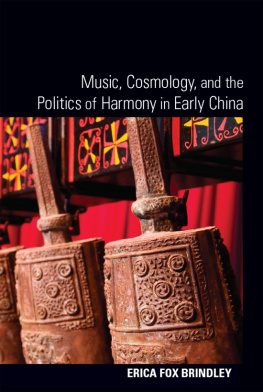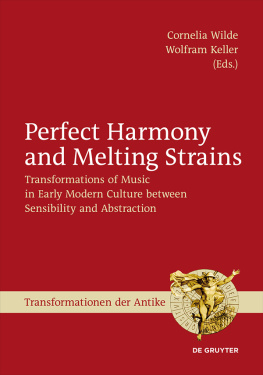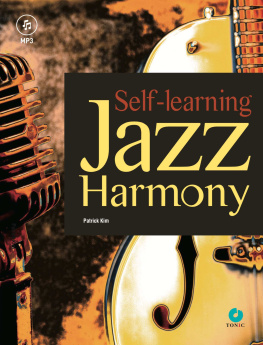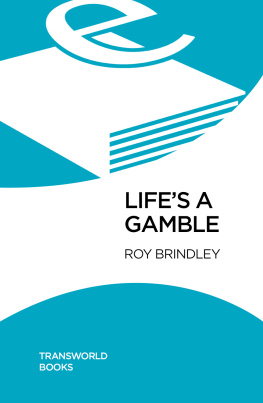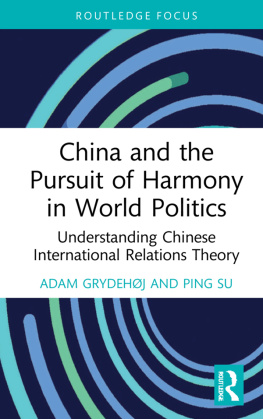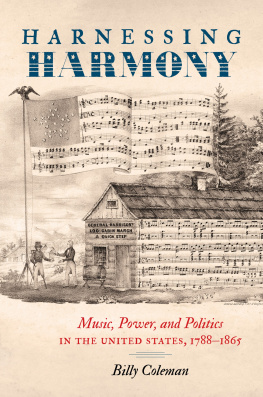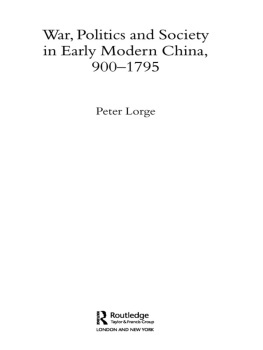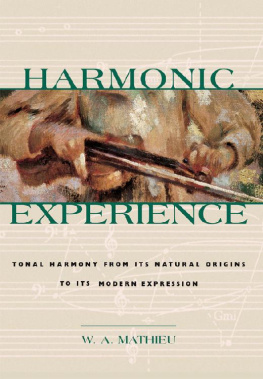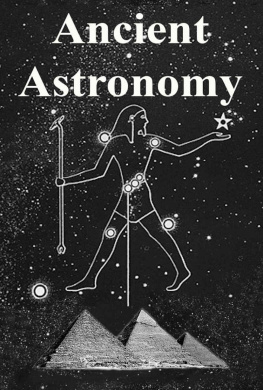Brindley - Music, Cosmology, and the Politics of Harmony in Early China
Here you can read online Brindley - Music, Cosmology, and the Politics of Harmony in Early China full text of the book (entire story) in english for free. Download pdf and epub, get meaning, cover and reviews about this ebook. City: New York, year: 2012, publisher: State University of New York Press, genre: Religion. Description of the work, (preface) as well as reviews are available. Best literature library LitArk.com created for fans of good reading and offers a wide selection of genres:
Romance novel
Science fiction
Adventure
Detective
Science
History
Home and family
Prose
Art
Politics
Computer
Non-fiction
Religion
Business
Children
Humor
Choose a favorite category and find really read worthwhile books. Enjoy immersion in the world of imagination, feel the emotions of the characters or learn something new for yourself, make an fascinating discovery.
- Book:Music, Cosmology, and the Politics of Harmony in Early China
- Author:
- Publisher:State University of New York Press
- Genre:
- Year:2012
- City:New York
- Rating:5 / 5
- Favourites:Add to favourites
- Your mark:
- 100
- 1
- 2
- 3
- 4
- 5
Music, Cosmology, and the Politics of Harmony in Early China: summary, description and annotation
We offer to read an annotation, description, summary or preface (depends on what the author of the book "Music, Cosmology, and the Politics of Harmony in Early China" wrote himself). If you haven't found the necessary information about the book — write in the comments, we will try to find it.
Brindley: author's other books
Who wrote Music, Cosmology, and the Politics of Harmony in Early China? Find out the surname, the name of the author of the book and a list of all author's works by series.
Music, Cosmology, and the Politics of Harmony in Early China — read online for free the complete book (whole text) full work
Below is the text of the book, divided by pages. System saving the place of the last page read, allows you to conveniently read the book "Music, Cosmology, and the Politics of Harmony in Early China" online for free, without having to search again every time where you left off. Put a bookmark, and you can go to the page where you finished reading at any time.
Font size:
Interval:
Bookmark:
SUNY SERIES IN CHINESE PHILOSOPHY AND CULTURE
Roger T. Ames, editor
Music, Cosmology, and the Politics of Harmony in Early China
Erica Fox Brindley

Cover image courtesy of Bigstock Photos
Published by
STATE UNIVERSITY OF NEW YORK PRESS
Albany
2012 State University of New York
All rights reserved
Printed in the United States of America
No part of this book may be used or reproduced in any manner whatsoever without written permission. No part of this book may be stored in a retrieval system or transmitted in any form or by any means including electronic, electrostatic, magnetic tape, mechanical, photocopying, recording, or otherwise without the prior permission in writing of the publisher.
For information, contact
State University of New York Press
www.sunypress.edu
Production, Diane Ganeles
Marketing, Michael Campochiaro
Library of Congress Cataloging-in-Publication Data
Brindley, Erica Fox.
Music, cosmology, and the politics of harmony in early China / Erica Fox Brindley.
p. cm. (SUNY series in Chinese philosophy and culture)
Includes bibliographical references and index.
ISBN 978-1-4384-4313-3 (hardcover : alk. paper) 1. MusicPolitical aspectsChinaHistory. 2. MusicSocial aspectsChinaHistory. 3. MusicPhilosophy and aesthetics. 4. ChinaHistoryZhou dynasty, 1122-221 B.C. 5. ChinaHistoryQin dynasty, 221207 B.C. 6. ChinaHistoryHan dynasty, 202 B.C.220 A.D. I. Title.
ML3917.C6B75 2011
780.931dc23
2011036271
10 9 8 7 6 5 4 3 2 1
Acknowledgments
Many lovers of music, aesthetics, ideas, and the history of science and religion helped in the making of this book. I am indebted to their insights and thank them all graciously for taking the time to peruse parts of the work and offer their thoughts. I am most grateful to the two anonymous reviewers for this book. It is clear that both reviewers put a lot of care into their feedback. One reviewer's notes were so careful and on the mark that I have no doubt that the current version of this book is significantly better because of them. Nancy Ellegate and Roger Ames at SUNY were also a pleasure to work with and have given me many reasons to want to continue to publish in this series and with this press. And many thanks to Joseph Lam, Scott Cook, David Schaberg, and Miranda Brown for providing invaluable comments on very early drafts of material that have since been incorporated into this book.
At my home institution, Penn State, I would like to thank my colleagues, especially my amazing senior colleagues involved in Asian Studies, who have all supported the publication of this book, if merely by the power of their virtuosic collegiality. In particular, I thank On-cho Ng for being a great mentor and friend and Eric Hayot for his friendship and our many philosophic discussions about scholarly pursuits. In addition, I am grateful to Penn State College of Liberal Arts, Asian Studies, and Department of History for their funding to help defray publication costs. I also thank Ronnie Hsia, Sophie de Schaepdrijver, Tina Chen, Carrie Jackson, Jennifer Boittin, Chunyuan Di, Yuexing Li, and Michelle and Todd Rodino-Colocino for their collegiality and friendship during the period of writing and publishing this book.
I dedicate this book to my husband, Derek Brindley Fox, who never ceases to amaze me with his kindness, big heart, helpfulness, and empathic abilities. I also dedicate this book to my first-born daughter, Claire Pualani Brindley Fox (Qian Yeming ), most of whose existence has covered the period during which this book was created and refined. Incidentally, Claire's Hawaiian name means Flower of the Heavens, and resonates not only with the work I have been doing but with my husband's expertise in astronomy. And lastly, speaking of the heavens, I thank my lucky stars for my entire family, which includes the latest addition, Lia Leilani Brindley Fox (Qian Yexin ).
Parts of were published as Sound Phenomena: The Cosmic Power of Sound in Late Warring States and Han Texts, Journal of Chinese Religions 35 (2007), p135. The author thanks Koninklijke Brill NV and the Journal of Chinese Religions for their permission to reprint these articles in this book.
Prologue
The concept of harmony is central to music and musical endeavors. It also represents a foremost goal for political regimes all over the world, both ancient and contemporary. In coverage of the 2008 Beijing Olympics, for example, newscasters on NBC read from Chinese scripts that explained various musical performances in terms of the ancient value of harmony. Viewers were presented with a picture of China as a world leader that hopes to contribute to human flourishing in a peaceful, innovative, and, indeed, splendid way. A multiplicity of ethnic groups entered the stage to represent the diverse faces of the People's Republic. The message of harmony amid diversity resonated throughout the Olympic Stadium, and the world smiled at such a noble and magnificent goal.
The rhetoric of harmony in the People's Republic, however, is complicated, and some might claim that it does not always point to a satisfactory reality for all. Recently, dissident voices in the People's Republic have coined the term he xie , the contemporary word for harmony, to point to the phenomenon of state censorship on the Internet. This is certainly suggested by the Internet critics of he xie.
The purpose of this book is not to pursue how the current Chinese state employs the notion of harmony in its presentation of itself and through its policies and actions. It is also not to criticize the current regime by means of the age-old Chinese scholar-official's technique of examining the past in order to highlight current problems. Rather, I raise the issue of current uses of harmony to set the stage for thinking about possible political uses and implications for theories on music and harmony in ancient times.
In this book, I show how discussions of music in early Chinabased primarily on conceptions of harmony and balanceserved as an important political and cultural tool for the state and its elite corps of ministers and intellectuals. The fact that the notion of harmony is still utilized as a tool that aids in state and social control, I think, attests to its effectiveness as something that speaks to people and resonates powerfully with Chinese longstanding political goals for state, imperial, or national unity, providing people and rulers alike with a familiar touchstone for speaking about the goal of cultural and political coherence and order at all levels of society.
For many authors in early China, music came to occupy a position of extreme importance in relationship not just to individuals and society, but to the larger cosmos as well. Around the fourth to third centuries BCE, authors of many different intellectual proclivities began to invoke metaphors of harmonious music to describe the workings of the cosmic Dao. Some authors even went beyond figurative associations to assert a primary, functional connection between harmonious music and the inherently balanced patterns or operations of nature and the cosmos. At first glance, one might not think to place too much value on such claims, since during the late Warring States and early imperial periods, assertions that referenced or invoked human connections to the cosmos were a matter of course. But upon closer inspection, one sees that music held an especially privileged relationship to the cosmos, above and beyond other elevated human activities such as the five other arts of a gentlemanly education and sometimes even ritual (though music was often later considered to be a part of ritual). Indeed, while mastery of such other pursuits was integral to social standing, personal cultivation, and evenif one were a rulerstate order, music came to include and surpass these as a vital path to the highest levels of spiritual elevation and cosmic order.
Next pageFont size:
Interval:
Bookmark:
Similar books «Music, Cosmology, and the Politics of Harmony in Early China»
Look at similar books to Music, Cosmology, and the Politics of Harmony in Early China. We have selected literature similar in name and meaning in the hope of providing readers with more options to find new, interesting, not yet read works.
Discussion, reviews of the book Music, Cosmology, and the Politics of Harmony in Early China and just readers' own opinions. Leave your comments, write what you think about the work, its meaning or the main characters. Specify what exactly you liked and what you didn't like, and why you think so.

